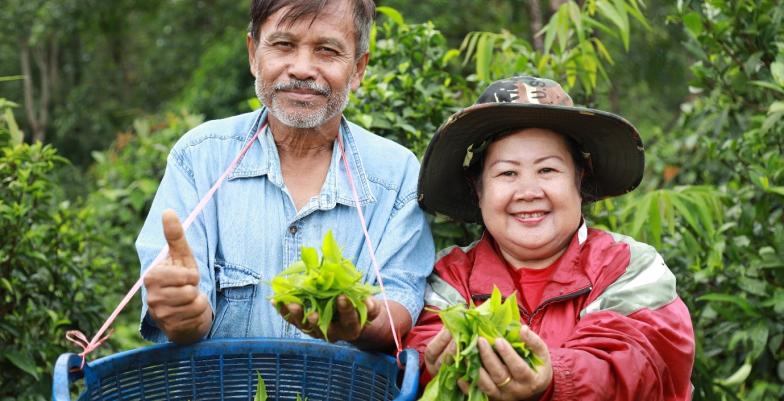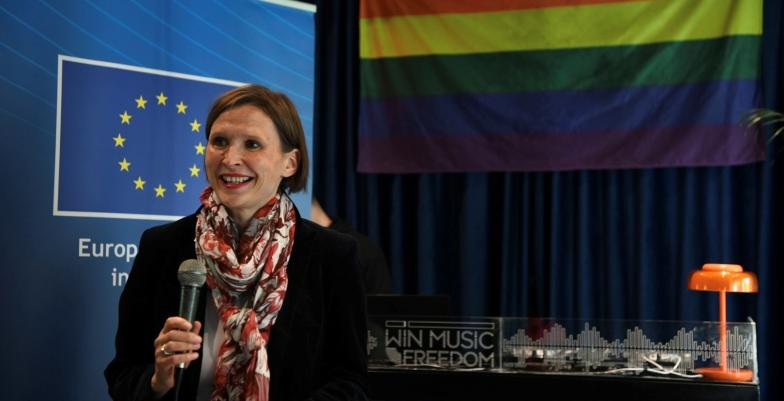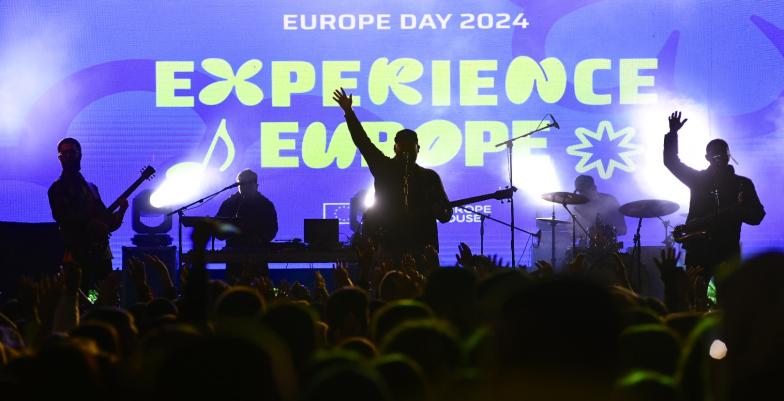Relations with the EU
The European Union and Kosovo
As a potential candidate for EU accession, and given Kosovo´s recent history, its relations with the EU are complex and multi faceted. On this page you will find an overview of all the different components of these relations.
Political Relations
The European Union has played a leading role in the international effort to build a new future for Kosovo since 1999. Kosovo has a clear European perspective as part of the wider Western Balkans region.
The European Union Office in Kosovo plays a pivotal role in implementing the EU agenda in the territory, especially the promotion of European norms. The Office ensures permanent political and technical dialogue between Kosovo and the EU institutions.
The EU is also active in Kosovo through its Special Representative (EUSR), which offers advice and support to the Government of Kosovo, coordinates the EU presence, and promotes human rights and fundamental freedoms.
Additionally, the Common Security and Defence Policy (CSDP) mission, the European Union Rule of Law Mission in Kosovo (EULEX), provides support to relevant rule of law institutions in Kosovo on their path towards increased effectiveness, sustainability, multi-ethnicity and accountability, free from political interference and in full compliance with international human rights standards and best European practices.
The EU is also present through member countries’ Embassies and Liaison offices.
Stabilisation & Association Process
The Stabilisation and Association Process (SAP) is the European policy framework for relations between the EU and the Western Balkan countries, all the way to their eventual accession to the Union. The partnership between the EU and the Western Balkans is in the interest of all sides, promoting peace, stability, freedom, security and justice, prosperity and quality of life. The SAP promotes stabilisation and the transition to a market economy, regional cooperation and preparation for EU accession.
The EU has conducted regular meetings with the Kosovar authorities as part of the Stabilisation and Association Process Dialogue (SAPD). This monitors progress in the EU enlargement process (see the Economic Relations section below). With the entry into force of the Stabilisation and Association Agreement (SAA) between the EU and Kosovo on 1 April 2016, the dialogue framework takes place within the SAA framework, in sub-committees.
The EU and the Kosovar authorities discuss a wide range of policy issues and agreeing on follow-up actions in meeting conclusions. Plenary meetings are held once a year. Prior to each Stabilisation and Association Process Dialogue, the EU discusses the same issues with local civil society. The Annual Country Reports assess the readiness of the Western Balkan countries to move closer to the EU.
A permanent dialogue between the Commission and CSOs from the enlargement countries was established in 2008.
The European Union Office to Kosovo engages in a regular dialogue with civil society organizations during the Progress Report drafting process. Prior to the Progress Report drafting, civil society organizations are invited to provide their input to the sectoral meetings of the Stabilization and Association Dialogue.
Economic Relations
The European Union – both its member states and its institutions, notably the European Commission – played and continues to play a prominent role in the reconstruction and development of Kosovo. The EU is by far the single largest donor providing assistance to Kosovo and the Western Balkan region.
In the framework of IPA I, IPA II and other EU instruments, from 2007 to 2020, the EU has invested in Kosovo more than €1.5 billion in reconstruction, public administration reform, rule of law, sustainable economic reform, education, agriculture, social development, civil society and media and many other key areas in Kosovo.
While the EU’s assistance initially focused on emergency relief actions and reconstruction, it now concentrates on promoting Kosovo’s institutions, sustainable economic development and Kosovo’s European future.
The European Union Office in Kosovo works alongside thirteen EU member states’ embassies in Kosovo, many of which manage substantial financial assistance programmes of their own. Four more Member States have representative offices. Numerous non-governmental organisations from EU countries are active in Kosovo.
In the context of the Stabilisation and Association Process (SAP, see above) that is seeking to bring Kosovo in line with European norms, the EU has several mechanisms to promote economic development on top of our financial assistance, such as trade concessions, and treaties (Stabilisation and Association Agreements).
Technical and financial cooperation
The European Union's political and financial commitment to Kosovo is two-fold. The EU provides assistance to meet Kosovo's institution-building needs and socio-economic development, and it provides a substantial contribution to the international presence in Kosovo.
The EU’s financial and technical assistance builds up the capacities of the institutions throughout the accession process, resulting in progressive, positive developments in Kosovo and the region. For the period 2014-2020, the Instrument for Pre-Accession Assistance II dedicated € 11.7 billion for the Western Balkans and Turkey. IPA III is set to deliver another € 14.5 billion for these countries.
Kosovo - financial assistance under IPA II
Kosovo – financial Assistance under IPA III
IPA III presents a solid policy-driven approach, with the strategic and dynamic deployment of assistance, putting the ‘fundamentals’ at its core: the rule of law and respect of fundamental values; strengthening democratic institutions and public administration reform; promoting economic governance and reforms towards competitiveness.
The new instrument will also increase steer from the Union, with programming based on thematic priorities rather than country envelopes. This allows for rewarding performance and progress towards key priorities and an increased flexibility to respond to the evolving needs of the partners in their path towards accession.
Kosovo also benefits from various instruments: TAIEX, European Instrument for Democracy and Human Rights, the Instrument contributing to Stability and Peace (IcSP) and the Foreign Policy Instrument (FPI), and several EU programmes including Erasmus+, COSME, Europe for Citizens, Creative Europe, Fiscalis, Customs, and during IPA III Horizon Europe.
In the past, the EU has provided support to Kosovo under a variety of financial instruments, including Community Assistance for Reconstruction, Development and Stabilisation (CARDS), macro-financial assistance (MFA) and humanitarian aid.
For more information about EU Technical and Financial Cooperation with Kosovo, visit the Kosovo Projects website.
Development Fund
The Development Fund for the municipalities in the north of Kosovo was established as a result of the EU facilitated Dialogue between Kosovo and Serbia.
COVID 19 Cooperation
The EU stepped in immediately to demonstrate its solidarity and support to Kosovo during COVID-19, with the aim of alleviating the pandemic impact.
The EU has granted the government EUR 7.03 million for the purchase of approximately 700,000 doses of covid-19 vaccines through a re-sale agreement involving EU Member States. The first such agreement was signed with Austria, which is ensuring delivery of 95,000 doses. The EU also provided direct support to the Kosovo health sector including the delivery of equipment and goods for prevention, protection and treatment of Covid-19 in the amount of EUR 5 million.
In terms of direct financial support, the EU has provided Macro-Financial Assistance of EUR 100 million in the form of a loan.
The EU also re-programmed parts of the planned annual programmes for 2019 and 2020 to create a financial package of EUR 50 million for the economic and social recovery including:
- EUR 26.5 million in direct budget support via a newly developed “EU4 Resilience” project, which started in December with a first tranche of EUR 20 million disbursed to the Kosovo budget.
- EUR 11.9 million for “EU4 Social protection”, which is ongoing.
- EUR 11.6 million for support to small businesses and other immediate needs which are underway.
In addition to the EUR 150 million of new or reprogrammed financial assistance, the EU managed to speed up the disbursements of EUR 13 million of ongoing direct budget support programmes on Public Administration Reform and Public Finance Management.
Support to Civil society
Civil society organisations play a vital role in the reforms carried out in candidates and potential candidates for EU membership. Their work can prove crucial in determining the pace and quality of the accession process, as well as generating public support for accession.
The EU values CSOs' diversity and specificities. It engages with transparent and accountable CSOs, which share a commitment to social progress and the fundamental values of peace, freedom, equal rights, and human dignity.
Besides financial assistance, the Commission intends to improve consultations with civil society representatives and work towards other measures to bolster civil society.
At the beginning of each year an indicative calendar of consultations with civil society is published on the website of the EU in Kosovo.
European Union Special Representative
According to his Mandate, the European Union Special Representative (EUSR) offers the Union’s advice and support in the political process, ensures the coherence of EU action in Kosovo, contributes to the development and consolidation of respect for human rights and fundamental freedoms in Kosovo, and strengthens the visibility of the Union through public communication and outreach activities.
Political and Policy Coordination
In line with the EUSR’s mandate, the Section provides Kosovo authorities with EU’s advice and support in political processes and participates in monitoring and fostering Kosovo’s advancement on EU-related political priorities. Its work encompasses establishing and sustaining a network of contacts with local stakeholders, providing political analysis and reports, evaluating the impact of political developments, and crafting EU outreach strategies in collaboration with other EU and international counterparts. In addition, the Section coordinates the EU presence in Kosovo and offers political guidance to the EU Rule of Law Mission in Kosovo. The Section also supports the EU-facilitated Dialogue and the activities of the EUSR for the Belgrade-Pristina Dialogue and other Western Balkans regional issues.
Non-Majority Communities, Religious Cultural Heritage and North
The Section contributes to the development and consolidation of the respect, protection and promotion of fundamental rights of non-majority communities throughout Kosovo in accordance with the applicable legislation. In that regard, the Section maintains regular contacts with community representatives from central and local level, including Kosovo institutions and civil society sector.
The Section is also responsible for fostering the protection of the rights of religious communities and of Kosovo’s religious and cultural heritage. It maintains a close overview of political and security-related developments in northern Kosovo.
Development Fund
The Development Fund for the four northern municipalities (Leposavić/Leposaviq, Mitrovica North, Zubin Potok and Zvečan/Zveçan) was established as a result of the EU-facilitated Dialogue between Belgrade and Pristina. The Fund is managed by a Board composed of the EUSR as the Chair, the Minister of Finance on behalf of the Kosovo authorities, and a representative of the Kosovo Serb community from the northern municipalities.
Rule of Law, Human Rights and Legal Matters
The Section provides day-to-day contribution to the development of the rule of law sector and the advancement of human rights and gender equality in Kosovo. Specifically, it provides consolidated advice on the EU acquis to the Government and the Parliament throughout the legislative process and facilitates mutual legal assistance and judicial cooperation between Kosovo and its external counterparts.
Legislative Review Mechanism
The Section leads the Legislative Review Mechanism that is aimed to ensure coordination and consolidation of the expertise of the EU family on Kosovo’s legislation. Through this Mechanism, the Section provides timely and effective guidance to the local institutions on the alignment of draft legislation with the EU acquis, best European practices and the documents enumerating the benchmarks set for Kosovo, such as the Progress Reports, Visa Liberalisation Roadmap and the Stabilisation and Association Process.
Mutual Legal Cooperation in Criminal and Civil Matters
The Section facilitates mutual legal assistance and supports judicial cooperation between Kosovo and its external counterparts as well as countries that do not recognise Kosovo. The Section also provides legal advice on legal cooperation to the Ministry of Justice by reviewing and advising on legislation, international agreements and strategic documents related to legal cooperation in civil and criminal matters.
Human Rights
The Section contributes to the development and consolidation of human rights and fundamental freedoms in line with the EU and international standards. The Section provides technical advice and policy support to Kosovo institutions on a variety of issues, including but not limited to transitional justice, the rights of children and people with disabilities, freedom of expression and media, freedom of assembly, LGBTI rights, property rights and non-discrimination.
Gender Equality
The Section assists the EUSR in promoting gender equality as a crucial value to ensure political stability and achieve economic development in Kosovo in accordance with the EU and international standards. In coordination with international partners, the Section supports the EUSR in monitoring, advising and mentoring Kosovo institutions on the advancement of women’s rights, namely the Agency for Gender Equality, gender officers, the National Coordinator against Domestic Violence and the Women Caucus of the Kosovo Assembly.
Communication Section
The communication efforts of the EU Special Representative in Kosovo aim to bring the work of the EUSR closer to the Kosovo people through traditional and digital media, as well as outreach events and other types of communication activities. We provide communication support to the EUSR's engagement with Kosovo authorities, civil society, academia, non-majority and religious communities, business community, other EU presences in Kosovo, and different international organisations, in line with the EUSR mandate. For media queries regarding the EU in Kosovo, please contact Ioanna Lachana, Head of the Communication Section and Spokesperson, at [email protected], phone number: +383 (0) 49784441.
Finance and Administration Section
The Section is in charge of ensuring effective operational functioning of the office of the EUSR. It is directly responsible for the strategic forward planning of EUSR resources, their development and deployment, budget management, financial management, control and reporting, recruitment and human resources management, procurement of services and projects, and logistics support. The Section provides day-to-day staff management advice, taking initiative and providing active support to the EUSR on the strengthening of the office's internal operational effectiveness and quality assurance, its structure and operating practices.
See the Status of EUSR Vacancies.
Security
The Mission Security Officer leads, directs and manages the security and safety of the EUSR staff members. The Mission Security Officer also monitors and assesses the security situation in Kosovo and provides security analysis and advice to the EUSR and the senior management on all security-related matters that affect the office, its assets and personnel. The Mission Security Officer liaises closely with national law enforcement agencies, NGOs, international organisations, EU institutions and diplomatic representatives in the field of security.








